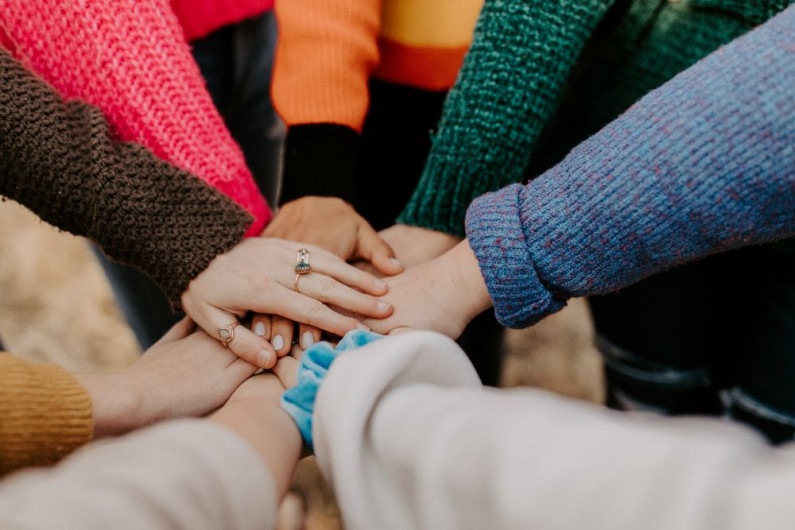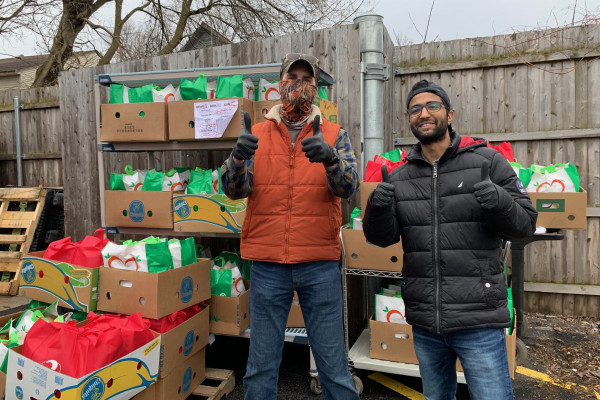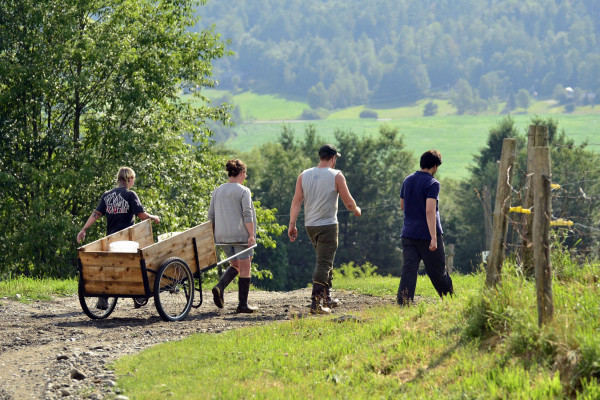Due to the spread of COVID-19 in Vermont, Lake Champlain Chocolates experienced a surplus in its supply of Easter chocolate eggs.
Read more about "Lake Champlain Chocolates Donates Chocolate Eggs"Share Our Post:
The VT COVID-19 Response Fund Recovery Initiatives: A Q+A on Welcoming, Equitable, Anti-Racist Communities

The Community Foundation established its VT COVID-19 Response Fund in March 2020 to encourage collective, coordinated grantmaking efforts that can quickly adapt to changing circumstances. Since that time, grants have gone to ensure vulnerable populations receive basic needs—something that is top of mind given recent spikes in cases. In September 2020, we announced five recovery initiatives that address key challenges magnified by the pandemic: Rural Entrepreneurship, Food System Resilience, Rural Connectivity, Learning in Transition, and Welcoming, Equitable, Anti-Racist Communities. Through focused grantmaking, our goal is to set the state on a pathway to more equity and greater resilience in the face of future disruption.
Welcoming, Equitable, Anti-Racist Communities
Between the COVID-19 pandemic’s disproportionate impacts on Black, Indigenous, and people of color (BIPOC) communities, public visibility to senseless police killings, and the brutal treatment of American citizens expressing their free speech, 2020 was a perfect recipe for the United States—and Vermont—to reawaken to the deeply embedded systemic racism that exists in our country. This renewed attention to the circumstances that BIPOC individuals face every day presents an opportunity to put Vermont in a better place post-pandemic that is welcoming and inclusive to everyone.
Demographic trends show that the future makeup of our state will continue to be more diverse, and we at the Vermont Community Foundation believe that’s a really good thing. The Foundation wants to create positive interactions and safe spaces to both discuss what it means to be a welcoming, inclusive, anti-racist community, then actually begin to take action to implement those changes. To learn more about the Welcoming, Equitable, Anti-Racist Communities recovery initiative, we spoke with Grants & Community Investments (GCI) Vice President Sarah Waring, as well Brockton Corbett, Dave Rahr Community Philanthropy Fellow and GCI team member.
Why has the Community Foundation decided to focus on Welcoming, Equitable, Anti-Racist Communities as part of its pandemic recovery strategy?
The Vermont Department of Health reported as recently as December 2020 that nearly 1 of every 5 COVID-19 cases in Vermont are among BIPOC Vermonters. Considering BIPOC individuals make up only six percent of the state population, there is a clear connection to why the Community Foundation determined a recovery initiative focused on systemic racism within communities is critical.
What makes this initiative unique among the Community Foundation’s recovery initiatives is that it is the only one that tackles Vermont’s culture and quality of life rather than an economic system. This is about how we treat each other, which has trickle-down effects into business, education, healthcare—it’s all encompassing. It also means we need to change our way of thinking about what constitutes progress, which we describe later on.
What does a grantmaking strategy in support of Welcoming, Equitable, Anti-Racist Communities look like in action?
In the broadest sense, we’re taking a step back and using our grantmaking to extend the capacity of existing organizations to take on or expand dialogue around systemic racism. In developing these strategies, we worked closely with advisors of color to help understand where and how we could meaningfully engage on racism, discrimination, community inclusion (or exclusion) in cities and towns across Vermont.
We identified critical statewide institutions—such as our public education system—as vital leverage points to embed expertise around diversity, inclusion, and anti-racism work. We know communities large and small are experiencing the impacts of race relations in many ways, so we also chose to focus on supporting projects at the local level. In many regions, providing resources on how to engage citizens in dialogue is a crucial starting point for creating communities where people and families from all backgrounds are welcomed. And finally, part of our strategy included supporting BIPOC-led organizations and networks across the state.
These insights led us to develop four key components:
- Partner with four statewide member associations to facilitate learning around equity, power, and privilege so they can support individual members to implement best practices on the ground—the Vermont Principal’s Association, The Vermont School Boards Association, the Vermont Superintendents Association, and the Vermont League of Cities & Towns.
- Provide capacity to grassroots community groups to respond to racially charged incidents within their region, including smaller grants to support consultants, community dialogue, and arts or educational projects that engage individuals to dismantle discrimination and bias in their own communities together.
- Reinforce the work of organizations that build welcoming communities around affinity spaces for BIPOC Vermonters, such as the Burlington-based Vermont Professionals of Color Network, JAG Productions in the Upper Valley, and the Clemmons Family Farm in Charlotte.
- Join the state of Vermont to play an administrative role for Vermont’s Economic Stimulus Equity Fund, which will provide stimulus payments to Vermonters who were not eligible previously due to immigration status. This work is a collaboration of key organizations that are directly connected to individuals who may have undocumented or other ineligible status, such as Migrant Justice, Association of Africans Living in Vermont, Champlain Valley Office of Economic Opportunity, and community-based asylum seeker groups across Vermont.
What does success around Welcoming, Equitable, Anti-Racist Communities look like? How will it help make Vermont better for all Vermonters?
The best way to describe success is to share our vision of what a welcoming Vermont means:
- Where more people feel connected to their community and you don’t need to be afraid to visit certain towns based on how you look.
- Where businesses can easily recruit BIPOC individuals because they aren’t nervous about relocating.
- Where educators, students, local leaders, and families have tools and resources to handle issues of race and social discrimination as soon as they happen.
- Where it doesn’t matter how long you’ve lived here to be considered a part of the community.
We would argue this is a future that would make Vermont better for all Vermonters.
What hurdles currently stand in the way of success around this initiative, and how will they be addressed?
To truly change a system, we need to change whatever mentalities people within that system currently hold true. Vermont has long been a place with a deep identity, which for many, is at least partly defined by individuals’ values and shared experiences. However, if we recognize that these shared identities are also preventing our communities and businesses and schools from being welcoming of newcomers, then we must recover to a better place than we started.
In addition, Vermont is not exempt from racism, which is a learned behavior—like table manners or wearing your seatbelt—that needs to be changed, and old habits die hard. This initiative is attempting to combat 400 years of problems, and one year of increased grantmaking isn’t going to cut it; not in the rest of the country and not in Vermont. This is a long game.
What’s important to emphasize is that—for the Community Foundation—this feels like the beginning of our own learning journey. The COVID-19 pandemic and our associated grantmaking has only accelerated this.
How can the Community Foundation’s fundholders and donors help support its work around Welcoming, Equitable, Anti-Racist Communities?
When you encounter someone that is different—whatever that means to you—be friendly. Engage, ask questions, see how they’re doing. It all starts with us.
And stay tuned for grantmaking opportunities to support and reinforce the work that is already going on and will continue as we advance our own learning on combatting systemic racism and creating Vermont communities that can engage, invite, and include people from all backgrounds.
Don't forget to check out our other VT COVID-19 Response Fund Q+A's:


